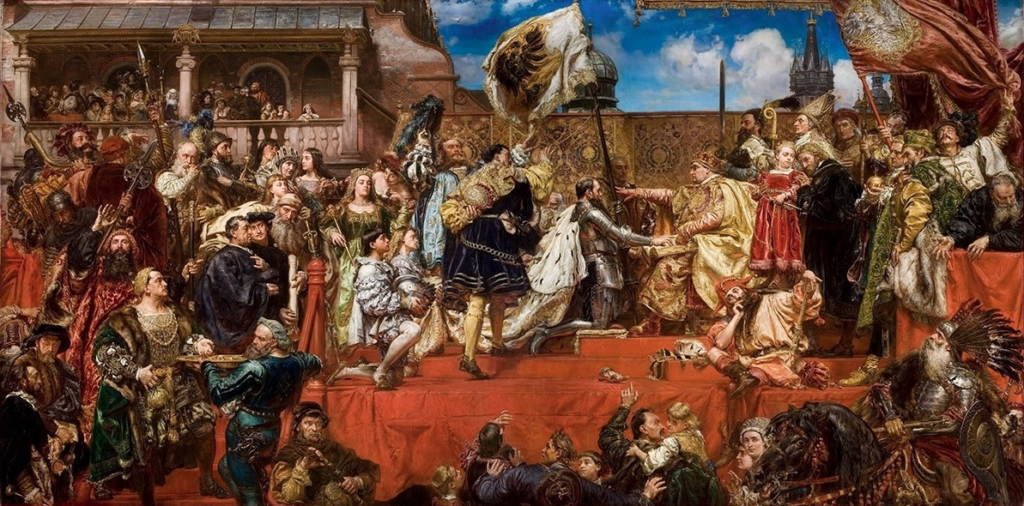In 1968 East Germany, Poland, Hungary and Bulgaria invaded Czechoslovakia. Why? Because they were client states of the Soviet Union and because the Soviet Union needed to defend socialism there. In 2022/23 Germany, Poland, Czechia, Slovakia, Romania and Bulgaria are more than impatient to intervene in Ukraine. Why? Because they are client states of the United States and the United States needs to save democracy and LGTB rights in Ukraine.
In 1968 Romania bravely resisted participation in the intervention in Czechoslovakia and so did not deploy troops there. In 2022/23 Hungary is courageously resisting involvement in the military affray in Ukraine. History can repeat itself, it can! All the other European states – west or east – are compliant.
Such is the fate of client states. The Warsaw Pact countries of eastern Europe wanted badly to liberate themselves from the Soviet – as they put it – yoke. The time came that it was possible. What did they do next? They gladly imposed on their necks the American yoke and continue to comply. What did they do? They changed their overlord. The funny thing is that the fief or territory that they received from their new overlord remained the same as they had received from their old overlord: their own countries.
It has never been different throughout recorded history. When the Third Reich reigned supreme, it had its vassal or client states which were compelled to invade the Soviet Union; when Napoleon Bonaparte appeared to be an invincible god of war, he, too, had his vassal or client states with the help of which he invaded Russia or imposed a total trade blockade (in today’s parlance: sanctions) on the United Kingdom.
The fate of client states! This fate translates into being a stooge of the mighty sovereign to the detriment of the client state’s interests. What imaginable sense did it have for the German Kingdom of Saxony to invade Russia in 1812? What sense did it have for Hungary to deploy its troops somewhere in the vicinity of Stalingrad in 1942/43? What sense did it make for Poland to get involved in the street riots in Minsk, Belarus, in 2022? How could Saxons benefit from helping Napoleon conquer Russia? How could Hungarians benefit from helping Hitler defeat Stalin? How can Poland benefit from – as they put it – regime change in Minsk?
Such is the fate of client states. They must do the bidding of their overlords, come what may or else. A sad fate. Their leadership (if that is the right word for it!) must believe and make the country’s citizens believe that they do not serve the sovereign but themselves, with the sovereign’s interests just (miraculously) happening to overlap with those of the vassal state. They must come into line now with socialist values, now with democratic values. Their leaders must prostrate themselves to their overlords and put on a brave face. Why? Because they are mentally and materially dependent on their overlord or… their lord can compromise them before their own nations. Go choose which is the worst case scenario!
There are very few leaders of vassal states who challenge the overlord – up to a point, of course. Think of present-day Hungary under Viktor Orban, who refuses to parrot Washington’s or Brussels’ narrative with reference to the war in Ukraine or think of Romania under Nicolae Ceausescu, who refused to suppress a political movement in Czechoslovakia. These are exceptions that prove the rule. One can be certain that the overlord has his tentacles in disobedient countries, backing the opposition there.
A client state is a sorry sight. It is painfully saddening to see the German chancellor, a man in charge of an otherwise economically powerful state, not lifting his pinky to do something about the disruption of the pipeline that kept the economy of his country running. It is a sad picture to see all those European leaders patting themselves on the shoulders and pandering to Washington’s political wishes. One can be sure that in their heart of hearts they are sick and tired of bending over backwards to the dictates coming from the Potomac (because Victoria Nuland’s “fuck the EU” must still reverberate in their ears); they must have enough of celebrating visits paid them by Zelensky (a comedy actor) and yielding to his requests – no! – demands for aid. They must feel ill at ease to keep lying and distorting the reality, like constantly saying to the people that a force smaller and weaker by a magnitude is going to win the war and even re-conquer Crimea! (Why not try making people believe that Ukrainians will have their victory parade along the Kremlin walls, throwing down Russian military banners at the tomb, oh sh*t, Vladimir Lenin?!) They must feel rather uncomfortable or embarrassed or…
Or at least that’s the feeling that I would have if I were in their shoes. It might be that they do not feel uncomfortable or embarrassed, maybe they are as spineless as we sometimes think they are.
That’s what client states are all about: they are fiefdoms in the classical sense of the word with their leaders remaining leaders – i.e. holders of the fiefdoms – only so long as they remain loyal to their overlord: in word and deed. Glaring disobedience is punishable by colour revolutions that lead to “regime change”. Glaring disobedience turns a government into a regime, a president into a dictator, and governance into dictatorship. We all know this, do we not?
How many overlords do we have in today’s world? Let me count: the United States, Russia, China, India, maybe the United Kingdom to a certain extent… is that all? Perhaps we might add Brazil, Pakistan, Iran, Saudi Arabia… Add to the equation a few client states are straining at the leash like Turkey, like aforementioned Hungary, like… ? Have we already run out of the list? How sad…

Prussian Homage, painting by Jan Matejko




